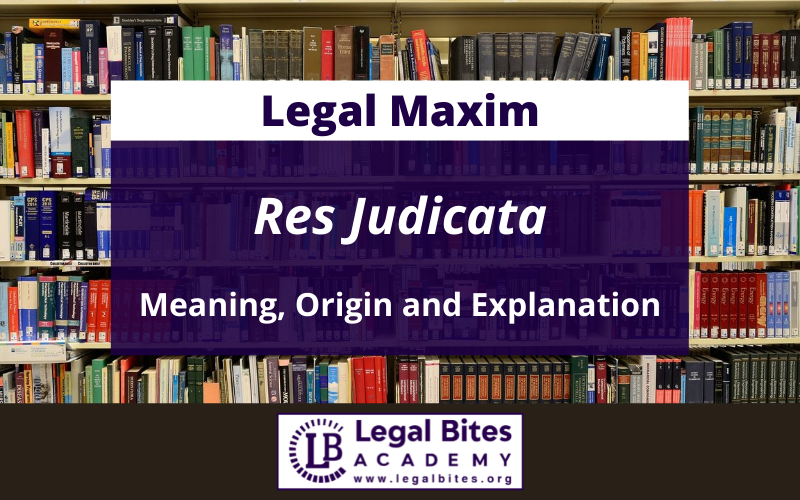Res Judicata: Origin, Meaning and Explanation
This article titled ‘Res Judicata: Origin, Meaning and Explanation’ is written by Sahajpreet Bhusari and discusses the legal maxim of Res Judicata. I. Origin and Meaning Res Judicata is a legal maxim of Latin origin. In Latin, the maxim refers to ‘a matter judged’[1]. II. Explanation The notion of Res Judicata is defined in Section 11 of the Civil… Read More »

This article titled ‘Res Judicata: Origin, Meaning and Explanation’ is written by Sahajpreet Bhusari and discusses the legal maxim of Res Judicata. I. Origin and Meaning Res Judicata is a legal maxim of Latin origin. In Latin, the maxim refers to ‘a matter judged’[1]. II. Explanation The notion of Res Judicata is defined in Section 11 of the Civil Procedure Code as a subject that has previously been decided. It means that no court will have the authority to hear a new suit...
This article titled ‘Res Judicata: Origin, Meaning and Explanation’ is written by Sahajpreet Bhusari and discusses the legal maxim of Res Judicata.
I. Origin and Meaning
Res Judicata is a legal maxim of Latin origin. In Latin, the maxim refers to ‘a matter judged’[1].
II. Explanation
The notion of Res Judicata is defined in Section 11 of the Civil Procedure Code as a subject that has previously been decided. It means that no court will have the authority to hear a new suit or problems that have previously been resolved in a previous dispute between the same parties.
This approach is founded on the idea that if a case has previously been determined by a competent court, no one has the authority to reopen it in future litigation. When matters directly and significantly implicated between the same parties in the previous and current litigation are the same, the court will use it.
III. Application
This notion is founded on two principles:
- one should not be afflicted twice for the same reason,
- litigation should be final.
The law of res judicata prevents the parties from filing a new suit for the same remedy if there has been an executable judgement between them.
IV. Illustration
X sues Y for breach of contract under Cause of Action, but X loses. As a result, X may not attempt again by filing a new case against Y on behalf of Z.
V. Case Laws
The Supreme Court held in Direct Recruit Class v. the State of Maharashtra And Ors.[2] that a conflict raised by a complaint under Article 32 should be held to be forbidden by res judicata doctrines, including the rule of constructive res judicata underlying Explanation IV of Section 11 of the Code of Civil Procedure if the same was previously decided by a competent court by a judgement that has become final.
“When it is argued that a prior judgement is res judicata, it means that the right asserted has been decided upon and cannot be placed in a contest between the same parties again,” the Supreme Court decided in Employees’ Welfare v. Union of India And Anr[3].
Res judicata is a previous decision of a competent Court on facts that form the basis of the right and the applicable statute that applies to the determination of the transaction that forms the basis of the right and the relevant law that applies to the determination of the transactions that form the origin of the right.
References
[1] Res Judicata, Available Here.
[2] 1990 AIR 1607.
[3] AIR 1990 SC 334.


